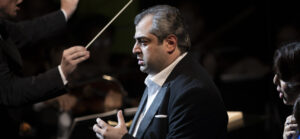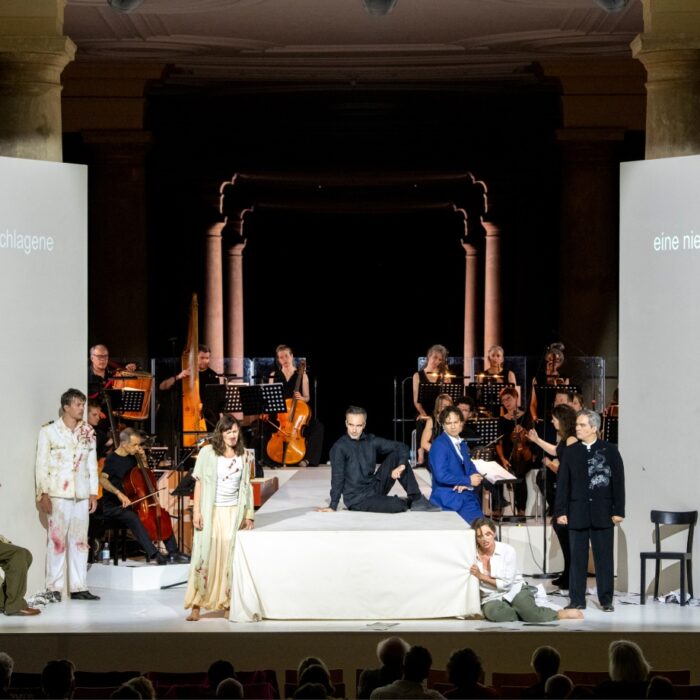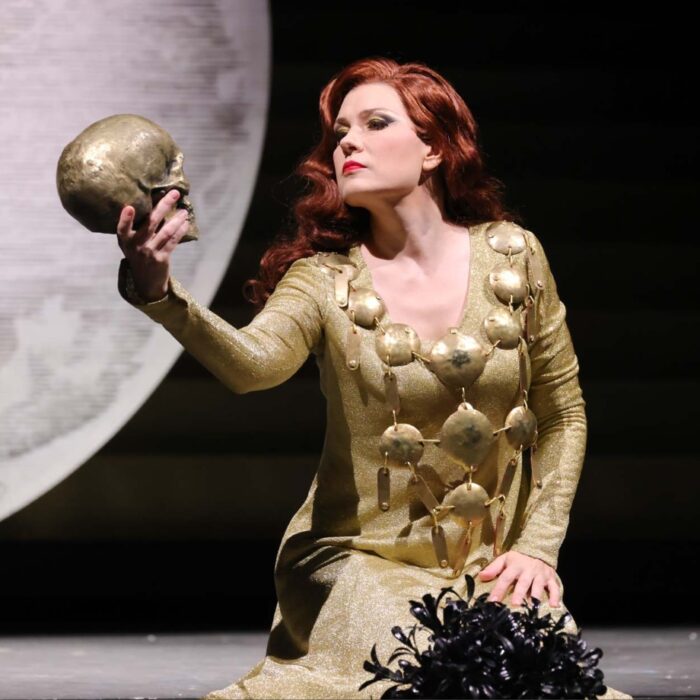
Festival d’Aix-en-Provence 2023 Review: Otello
Tenor Arsen Soghomonyan Shines as Otello in Festival d’Aix-en-Provence’s Concert Version of Verdi’s Masterpiece
By João Marcos CopertinoCredit: Vincent Beaume
When Pierre Audi, the director of Festival d’Aix-en-Provence, announced that Jonas Kaufmann and Ludovic Tézier would sing in a one-night-only concert version of “Otello,” tickets sold out in a minute. Even admittance for critics was scarce, and the festival gave seats out only when audience members turned in their tickets. Ill in London, Kaufmann canceled.
This reviewer’s love for “Otello” has had its ups and downs. The intense love affair with Verdi’s opera might have ended for a good 10 years ago when I saw a terrible production in São Paulo; the show was so bad that the thought of it feeds my acid reflux. Since the festival’s “Otello” would be in a concert version because it is an “unstageable opera” in today’s context, there was a desire to give “Otello” another try. Categorizing the opera as “impossible” heightened curiosity.
Conductor Michele Mariotti took to the podium, and with his forceful movement, the orchestra punched the audience with its thunderous sound. It was not a properly clean sound, but it was theatrical. The San Carlo Opera Chorus sang in that almost-shouting way that only Italian singers can master without being offensive to the ears. Everything was so intense that even the charming tenor Giovanni Sala, the night’s Cassio, began singing two bars early.
Then enters Kaufmann’s replacement, Arsen Soghomonyan, a singer who has not been a tenor for that long and is virtually unknown by French and American audiences. He calmly and soberly took to the stage, walking at a pace as if the music would wait for him to arrive at his mark to start. Sporting the most formal of all tailcoats, Soghomonyan opens his mouth, and what comes out is a voice not from today; it was a sound like something between di Stefano and del Monaco, Italian tenors whose operatic voices sounded as natural as an eagle flying.
In this “concert version” of “Otello,” all the singers—including the chorus—sang sans scores. Thus, the drama and the singers’ dramatic pulses were exposed. The night became not only the triumph of a tenor but the apotheosis of a certain kind of making—and staging—opera that sounds impossible nowadays.
When Audi alluded to the un-stageability of “Otello” nowadays, it was not only the racial issues raised by the opera. The conditions of opera today are so distinct from those of even a half-century ago that a certain feature essential for making “Otello” work looks too anachronistic even for the casual opera-goer. Yet, the festival has reinvented the game of operatic staging, innovating, and bringing theater into the action. The “impossibility” of “Otello” is, to a minor degree, a collateral effect of this revolution, which has made a certain aura of opera seem old. Modernization in staging has allowed opera to inject a certain contemporary vitality into a crystalized repertoire, but it also often alienates opera from its birth. The performance was, if not an apology, at least a beautiful elegy to what can no longer be.
A Shining Cover Performance
Arsen Soghomanyan is the kind of tenor who opens his arms to sing a higher note with a warm tone. His face moves only for the most essential of gestures: a kiss, a look, a smile. His phrases are beautifully crafted but come across as natural. His style is organic to his persona, yet extremely tasteful—never tacky, always visceral. His past as a baritone—he only became a tenor in 2017—gave him an allowance to face the audience as an Otello that can cut everyone off with his consonants and sharp Italian open vowels. In his interpretation, one can hear the brutality of Canio but also the heroism of Cavaradossi. His Otello is not only Otello; an entire operatic age comes to life. His command, “A terra!… e piangi!” was an unapologetically violent menace. The festival’s “Otello” worked so well precisely because it was a concert version. Were it a fully staged opera, it is possible such an impact would be lost; the addition of another dramaturgical discourse would make the audience expect things that the assembled cast could not provide.
While raining compliments on Soghomanyan is well deserved, he has limitations. Vocally, his voice is perfect for a late-nineteenth-century repertoire, but the Armenian tenor does not have the same marketability of a name such as Kaufmann’s. Few do. Though he entered as Kaufmann’s replacement, he left the stage as a hero, forcing everyone to remember the spelling of his name. Whether his star continues to rise is unknowable, and if his performance was a onetime happening, it was resplendent.
While all men dressed in white shirts, Ludovic Tézier as Iago wore a black shirt and the tightest of suits. His Iago had a lot of charm, with his disdainful face and his fluid, ornamented gesticulation. He walked on the stage freely; his movements exhaled into unobstructed singing that gave meaning to “panache.” “Tézier’s” masculine Iago did not fear playing with the trickster’s androgyny. He is a man, but his movements are attractive because they fall across the gender spectrum. Within Iago resided the sexual attraction of the devil’s serpent. Eden’s villain was clearly informing Tézier’s interpretation. He was not a nihilist, but a nefarious boy who set foxes’ tails on fire just to see them run, burning and destroying all the vineyards. The devil incarnate.
While Soghomanyan continuously proved himself through his strength and constant need to command the room with his voice and body, Tézier slithered onto the stage, unhurriedly taking all his breaks. Tézier waited as long as he could to say each word, having command of the text even in the sighs and silences, knowing his character relied on such details. His “E poi?.. E Poi? La Morte è Nulla!” had one of the longest pauses in the world, uttered as if the audience was completely unsuspecting of the extent of Iago’s skepticism.
Acting, Even in Concert Performances Matters
In this concert production of “Otello,” it was easy to believe in the characters, even though distinguishing factors such as costumes were absent. Yet, such sincerity in Maria Agresta’s Desdemona was missing. She sang everything correctly; her voice mastered all the technical difficulties of the score, but her acting lacked a sense of ease. She seemed to need a director to give her character the inner monologue that the others had figured out for themselves. Her exaggerated gestures, which were borderline histrionic, as if she sought an emotional status that was intellectual rather than visceral. Her voice, rich in the higher notes, had a very noticeable break of projection in the lower range. There was a lack of velvet in her voice.
That said, the singer’s technical greatness is undeniable. Desdemona is a tough role that requires the soprano to sing softly in the higher notes as if the character is always containing herself. Agresta sings the Act four arias—especially the “Ave Maria”—aware that her pianissimi must be the most important thing of the night. It was extremely beautiful and gained a deserved round of applause. But the issue was this: she gave us the results but also showed us the math.
Contralto Enkelejda Shkoza sang the role of Emilia. The character, so important in Act four, seems too small for the talents of any who sing it. Shkoza wandered the stage, singing her short lines in Act two, the only sane character present (“Qual frode scorgi? Ti leggo in volto”). Her voice was as huge as her vibrato. In Act four, her cathartic cries for justice are loud enough to be heard by whales under the sea.
The other cast members, Giovanni Sala, Alessio Cacciamani, Carlo Bosi, and Giuseppe Todisco, did a fine job. However, their performances, even with their pleasant vocal and stage personalities, were overshadowed by the fiery protagonists.
As the night faded towards its end, everyone felt melancholy that such musical joy was coming to a close. It was such an old-school night that the dry rivers of the Sahara were filled with Michele Mariotti’s sweat. He really wanted to show that his conducting was as full of effort as the singing of Soghomanyan and Tézier was natural. Mariotti incarnated the sufferable conductor, whose job is done with rust and bone, a weightlifter of musical quality.
When the night was over, the audience gave a standing ovation—a rare thing in France. It seemed souls had both grown and diminished after the blessed tragedy of the impossible “Otello.”


